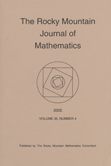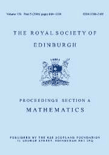
ROCKY MOUNTAIN JOURNAL OF MATHEMATICS
Scope & Guideline
Pioneering Research for a Dynamic Mathematical Community
Introduction
Aims and Scopes
- Algebra and Number Theory:
Research in this area includes studies on algebraic structures, number systems, and their properties, including congruences, modular forms, and various algebraic equations. - Analysis and Differential Equations:
This scope covers real and complex analysis, including studies on differential equations, fractional calculus, and inequalities that describe the behavior of functions. - Topology and Geometry:
The journal publishes work related to topological spaces, geometric structures, and their applications in various mathematical contexts. - Probability and Stochastic Processes:
Research in this area focuses on probabilistic models, stochastic processes, and their applications in mathematics and related fields. - Numerical Methods and Computational Mathematics:
This includes studies on numerical algorithms, approximation theory, and computational techniques in solving mathematical problems. - Functional Analysis and Operator Theory:
Research in this domain addresses concepts related to functional spaces, operators, and their applications in various mathematical disciplines. - Mathematical Modelling:
This area encompasses the development and analysis of mathematical models to represent real-world phenomena, including applications in physics, biology, and engineering.
Trending and Emerging
- Fractional Calculus and Differential Equations:
There is a growing trend towards the study of fractional differential equations, indicating an increased interest in non-integer order derivatives and their applications across various fields. - Mathematical Modelling in Applied Sciences:
Research that applies mathematical theories to model real-world phenomena is on the rise, reflecting the interdisciplinary nature of contemporary mathematics. - Operator Theory and Functional Analysis:
An increasing number of papers are focusing on operator theory, particularly in relation to functional spaces and their properties, suggesting a resurgence of interest in this foundational area. - Stochastic Processes and Applications:
There is a rising trend in research involving stochastic processes, highlighting their relevance in both mathematical theory and practical applications in fields such as finance and engineering. - Algebraic Structures and Their Applications:
The study of various algebraic structures, such as modules and algebras, is gaining traction, indicating a renewed interest in the foundational aspects of algebra and its applications.
Declining or Waning
- Classical Geometry:
While geometry remains a fundamental area of study, the focus on classical geometric properties and constructions has diminished in favor of more abstract and algebraic approaches. - Elementary Number Theory:
Though still relevant, the number of publications specifically addressing elementary number theory concepts has decreased, possibly due to a shift toward more complex algebraic and analytic number theory. - Discrete Mathematics:
There has been a noted reduction in papers focusing on combinatorial aspects and discrete structures, as more researchers gravitate towards continuous mathematics and its applications.
Similar Journals

CUBO-A Mathematical Journal
Championing Open Access in Mathematical InquiryCUBO-A Mathematical Journal, published by the Department of Mathematics and Statistics at Universidad de La Frontera in Chile, stands as a significant Open Access resource in the field of mathematics since its inception in 2011. With an ISSN of 0716-7776 and an E-ISSN of 0719-0646, this journal invites submissions that explore a wide spectrum of mathematical disciplines, including Algebra, Number Theory, Analysis, Geometry, Topology, and Logic. Although currently positioned in the Q4 category across various mathematical domains and registered at Rank #223/399 in General Mathematics in Scopus, CUBO serves as a valuable platform for emerging researchers and practitioners to disseminate their findings. Operating under a continuous commitment to accessibility, CUBO fosters an inclusive academic environment that supports the exchange of innovative ideas vital to advancing mathematics. The journal's target audience encompasses a diverse community of researchers, professionals, and students eager to participate in the expanding dialogue within mathematical sciences.

European Journal of Mathematics
Advancing Mathematical FrontiersWelcome to the European Journal of Mathematics, a prominent publication that serves as a vital platform for disseminating high-quality research in the field of mathematics. Published by Springer International Publishing AG, this journal has witnessed significant growth since its inception in 2015 and is recognized for its contributions within the Q2 category of Mathematics (miscellaneous) as per the 2023 rankings. With an ISSN of 2199-675X and an E-ISSN of 2199-6768, the journal aims to foster innovation and collaboration among researchers, professionals, and students alike. Although it operates under a traditional access model, the journal's commitment to advancing mathematical knowledge and applications cannot be overstated. Positioned among the top-tier publications, the European Journal of Mathematics is an essential resource that encourages the exploration of emerging trends and theories in mathematics, making it indispensable for anyone striving to stay at the forefront of this dynamic field.

Revista Matematica Complutense
Cultivating Excellence in Mathematical ScholarshipRevista Matematica Complutense is a prestigious peer-reviewed journal published by SPRINGER-VERLAG ITALIA SRL, specializing in the field of mathematics. With its ISSN 1139-1138 and E-ISSN 1988-2807, the journal plays a vital role in disseminating high-quality research and fostering academic discussion within the mathematics community. Recognized for its rigorous selection process, the journal has achieved impressive rankings, holding a Q1 quartile status in the miscellaneous mathematics category as of 2023 and ranking #94 out of 399 in general mathematics according to Scopus, placing it within the 76th percentile. With a publication timeline spanning from 2008 to 2024, the Revista Matematica Complutense continues to serve as an essential resource for researchers, professionals, and students alike. Although it does not currently offer open access, the journal remains committed to advancing mathematical knowledge and providing a platform for innovative research across various mathematical disciplines.

Matematicki Vesnik
Championing high-quality research in the mathematical community.Matematicki Vesnik is a distinguished open-access journal published by the MATH SOC SERBIA-DRUSTVO MATEMATICARA SRBIJE, dedicated to advancing the field of mathematics since its inception. With an ISSN of 0025-5165 and an E-ISSN of 2406-0682, this journal has been a significant platform for disseminating research findings since its establishment in 1993. Hosted in Serbia, it embraces a broad scope of mathematical discourse while achieving a Q3 category ranking in miscellaneous mathematics for 2023. As part of its commitment to fostering scholarly communication, Matematicki Vesnik is accessible to a global audience, promoting high-quality research and innovative ideas within the mathematical community. With converged years from 1999 to 2024 and a Scopus rank of #232 out of 399 in General Mathematics, the journal plays a crucial role in enhancing visibility and impact for researchers, professionals, and students alike in the dynamic landscape of mathematical inquiry.

Russian Mathematics
Advancing the Frontiers of MathematicsRussian Mathematics is an esteemed journal published by PLEIADES PUBLISHING INC, specializing in the field of mathematics. With its ISSN 1066-369X and E-ISSN 1934-810X, this journal serves as a vital platform for disseminating innovative research and advancements in various branches of mathematics. Established in 1992, it has earned its place in the Q2 category of the mathematics (miscellaneous) discipline, reflecting its growing influence and reputation within the academic community. Although it is not an open-access journal, its rigorous selection process ensures that only high-quality research is published, making it an invaluable resource for researchers, professionals, and students seeking in-depth insights into mathematical theories and applications. The journal has documented its evolution through a converged years format from 2010 to 2024, emphasizing its commitment to fostering scholarly discourse. With its address located at PLEIADES HOUSE, 7 W 54 ST, NEW YORK, NY 10019, UNITED STATES, Russian Mathematics is poised to contribute significantly to the global mathematical community.

PUBLICATIONES MATHEMATICAE DEBRECEN
Charting the Course of Mathematical ExcellencePublicationes Mathematicae Debrecen is a renowned international journal published by the University of Debrecen, Institute of Mathematics, situated in Hungary. This journal, with both ISSN 0033-3883 and E-ISSN 2064-2849, has established itself in the field of mathematics since its inception, with coverage extending from 1997 to 2024. Recognized for its rigorous academic standards, it currently holds a Q3 ranking in the mathematics (miscellaneous) category for 2023 and ranks at the 42nd percentile among general mathematics journals in Scopus. Publicationes Mathematicae Debrecen aims to disseminate high-quality research across various areas of mathematics, contributing to the advancement of knowledge and practice in this dynamic field. Although it is not an open-access journal, its readers can access a wealth of scholarly work that addresses both theoretical and applied mathematical issues, making it an invaluable resource for researchers, professionals, and students alike.

Mediterranean Journal of Mathematics
Pioneering New Paths in Mathematics Since 2004The Mediterranean Journal of Mathematics, published by SPRINGER BASEL AG, is a prominent platform dedicated to the advancement of mathematical research and education. Since its inception in 2004, this journal has been pivotal in disseminating high-quality research across various fields of mathematics, currently holding a notable Q2 ranking in the miscellaneous mathematics category as of 2023. With its ISSN 1660-5446 and E-ISSN 1660-5454, the journal enjoys a respected position in the academic community, evident by its Scopus rank of 129 out of 399 in General Mathematics, placing it in the 67th percentile. While primarily a subscription-based journal, it remains committed to providing a comprehensive resource for researchers, professionals, and students, fostering dialogue and exploration within the mathematical sciences. The Mediterranean Journal of Mathematics, based in Basel, Switzerland, continues to contribute significantly to the evolution of mathematical theory and practice, marking its relevance as we approach its 20th anniversary in 2024.

PROCEEDINGS OF THE ROYAL SOCIETY OF EDINBURGH SECTION A-MATHEMATICS
Unveiling New Dimensions in MathematicsPROCEEDINGS OF THE ROYAL SOCIETY OF EDINBURGH SECTION A-MATHEMATICS is a prestigious journal published by Cambridge University Press, focusing on high-quality research in the field of mathematics. Established in 1975, this journal has carved a niche in the academic community, evidenced by its categorization in the Q1 quartile for Mathematics (miscellaneous) in 2023 and a commendable Scopus rank of #59 out of 399 in General Mathematics, positioning it within the 85th percentile among its peers. The journal serves as a platform for disseminating innovative mathematical theories and methodologies, making it an essential resource for researchers, professionals, and students alike. Though not currently an open-access publication, it offers various access options catering to a broad audience. With a publication timeline extending through to 2024, PROCEEDINGS OF THE ROYAL SOCIETY OF EDINBURGH SECTION A-MATHEMATICS remains committed to advancing mathematical knowledge and fostering a scholarly environment conducive to scientific inquiry and collaboration.

Journal of Analysis
Elevating Knowledge in Analysis and Applied MathematicsThe Journal of Analysis, published by SPRINGERNATURE, serves as a crucial platform for disseminating advanced research in the fields of mathematics, particularly focusing on Algebra, Number Theory, Analysis, Applied Mathematics, Geometry, Topology, and Numerical Analysis. Since its inception in 2016, this journal has aimed to foster knowledge-sharing and innovation among researchers, professionals, and students. Boasting a diverse scope and a commitment to high-quality research, the journal is indexed in various categories with rankings that reflect its growing influence, particularly in Algebra and Number Theory (Q4), Analysis (Q3), and Applied Mathematics (Q3), among others. With an ISSN of 0971-3611 and E-ISSN of 2367-2501, it offers insightful articles that contribute to the ongoing discourse in mathematics. The journal is located in Germany, ensuring a European perspective while also welcoming global contributions. Researchers seeking to enhance their understanding and impact in their respective fields will find this journal an invaluable resource.

Archivum Mathematicum
Exploring the Frontiers of Mathematical KnowledgeArchivum Mathematicum is an open-access journal dedicated to the broad spectrum of Mathematics, published by Masaryk University, Faculty of Science in the Czech Republic. Since its inception in 1965, this journal has provided a platform for the dissemination of research and advancements within the mathematical sciences. It spans converged years from 2004 to 2024, ensuring ongoing relevance in a rapidly evolving discipline. Currently categorized in Q4 for 'Mathematics (miscellaneous)' and ranked #316/399 in general mathematics by Scopus, the journal aims to foster a collaborative environment for researchers, practitioners, and students alike, encouraging submissions that contribute to mathematical theory, applications, and education. With its commitment to open access, Archivum Mathematicum is a vital resource for anyone seeking to stay informed about emerging trends and findings in the field.